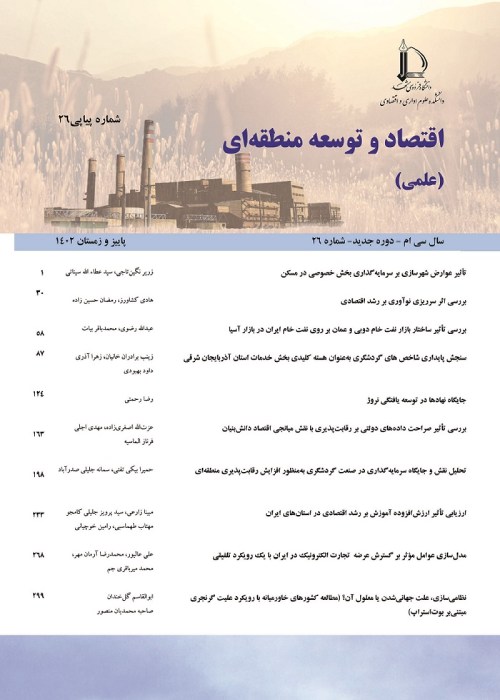Identifying and prioritizing cultural factors affecting the realization of the knowledge Based economy in Kermanshah province
The realization of a knowledge-based economy requires appropriate cultural prerequisites. According to Stiglitz, one of the first and most important issues is to provide cultural prerequisites and realize the effective cultural factors in this regard. In fact, cultural factors are one of the most crucial factors and prerequisites for transforming the economy of Iran and Kermanshah province into a knowledge-based, dynamic, persistent, capable, and competitive economy in the country. Therefore, this study used an institutional theoretical framework to identify and prioritize cultural factors affecting the realization of a knowledge-based economy. It is of high importance to have an appropriate institutional regime framework to facilitate interactions between different parts of the knowledge-based economy. The institutional regime consists of formal rules, informal (institutions) restrictions, and their executive characteristics. Informal institutions are the informal behavioral rules of society that are part of the culture. The most important cultural indicators affecting the realization of the knowledge economy were investigated and selected by referring to the previous literature and upstream documents and interviews with 14 experts in the field. Then, pairwise comparison questionnaires were completed by 20 experts, and indicators were extracted by Expert Choice. Finally, the indicators were prioritized by hierarchical analysis. According to the results of the study:1. Education as one of the most important elements of the knowledge-based economy accounts for the first priority (28%) among the top 10 indicators. Hence, it is necessary to have a skilled and educated workforce to provide efficiency, learning, dissemination, and application of knowledge, which leads to increased productivity of factors of production as well as economic growth and development. Among the components of education, primary education (56%) is the most important grade, whereas secondary education accounts for 18%, which indicates the major role of primary education in the knowledge-based economy. In fact, basic education strengthens the foundations of human capital by training the skilled and experienced workforce, resulting in the realization of a knowledge-based economy by creating a scientism institution and social capital.2. Rationality: To achieve development in the knowledge-based economy, it is necessary to refer to reason and thinking and strengthen the rational and scientific attitude of rationality in society, because the production of science and knowledge relies on thinking and a rational approach. This indicator (14%) accounts for the next priority after education in terms of impact on the realization of the knowledge-based economy in Kermanshah province. Among the dimensions of rationality indicator, the most important dimension is the position of science and knowledge (24%) and the most important component of the dimension is scientism (30%).3. Thinking skill: Development is an internal issue, a collective phenomenon, and an important goal that requires the highest degree of coordination and participation. In other words, there must be coordination and consistency in the thoughts and ideas for coordinating peoples' actions. Therefore, harmonizing the thoughts leads to harmony in the actions of individuals, flourishes creativity and innovation, and ultimately enables the achievement of the knowledge-based model. This indicator (9.6%) accounts for the third priority.4. The fourth indicator is justice (8.6%) with judicial justice as the most important dimension of the justice indicator. Moreover, the most important component of the judicial justice dimension is the fair implementation of laws. Justice affects the realization of the knowledge-based economy in two ways: 1) by creating equal access for all to public facilities, in particular, educational and health facilities, and ultimately, the realization of human development, which is one of the main institutional contexts for achieving a knowledge-based economy, and 2) by establishing equal conditions for all in order to attend a fair competition.5. The ethics indicator (8.1%) accounts for the fifth priority, with the political dimension with the meritocracy component in the transfer of responsibilities as the most important dimension of the indicator. According to Williamson's four-level analytical framework, many of the ethical values affecting the realization of the knowledge-based economy, such as the emergence of informal institutions produce development at the first level. Informal institutions formed at the first level lead to the emergence of some rules at the second level. According to the rules of the second level, the proper management is accomplished at the society, and finally, the results obtained in the previous three levels lead to the realization of a knowledge-oriented society in the fourth level.6. Subjective culture (7.5%) and social order (7.4%) (the sixth and seventh priorities) play a role in the realization of this new model of production. The most important component of subjective culture is the attitude towards learning science. Moreover, the most important dimension of the order indicator is legality and the most important component of the legality dimension is the respect for private property. 7. In addition, scientific independence (6.2%) and cultural interactions (6.2%) account for the same priority (the eighth and ninth priorities). However, the objective dimension of culture (4.6%) accounts for the last priority in terms of the effect on the realization of the knowledge-based economy so that mismatch rate of 2% also reflects consistency between the results. In general, since culture, knowledge transfer, values, and other factors affecting behavior are defined from one generation to another through education and imitation, education by training skilled and capable people results in the development of rational attitude and changes in the attitude of people. According to Max Weber, harmony in the attitude of individuals creates a kind of collective reason called rationality. On the other hand, governing rationality in society leads to the establishment of social order and its stability.
- حق عضویت دریافتی صرف حمایت از نشریات عضو و نگهداری، تکمیل و توسعه مگیران میشود.
- پرداخت حق اشتراک و دانلود مقالات اجازه بازنشر آن در سایر رسانههای چاپی و دیجیتال را به کاربر نمیدهد.



